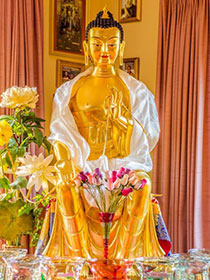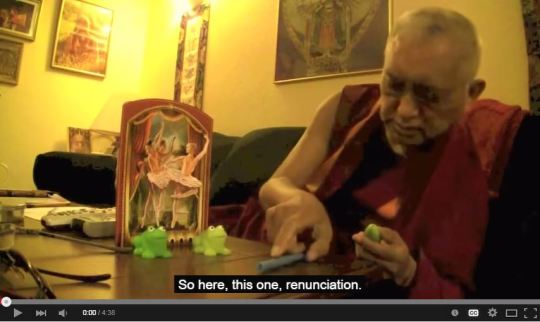- Home
- FPMT Homepage
Foundation for the Preservation of the Mahayana Tradition
The FPMT is an organization devoted to preserving and spreading Mahayana Buddhism worldwide by creating opportunities to listen, reflect, meditate, practice and actualize the unmistaken teachings of the Buddha and based on that experience spreading the Dharma to sentient beings. We provide integrated education through which people’s minds and hearts can be transformed into their highest potential for the benefit of others, inspired by an attitude of universal responsibility and service. We are committed to creating harmonious environments and helping all beings develop their full potential of infinite wisdom and compassion. Our organization is based on the Buddhist tradition of Lama Tsongkhapa of Tibet as taught to us by our founders Lama Thubten Yeshe and Lama Thubten Zopa Rinpoche.
- Willkommen
Die Stiftung zur Erhaltung der Mahayana Tradition (FPMT) ist eine Organisation, die sich weltweit für die Erhaltung und Verbreitung des Mahayana-Buddhismus einsetzt, indem sie Möglichkeiten schafft, den makellosen Lehren des Buddha zuzuhören, über sie zur reflektieren und zu meditieren und auf der Grundlage dieser Erfahrung das Dharma unter den Lebewesen zu verbreiten.
Wir bieten integrierte Schulungswege an, durch denen der Geist und das Herz der Menschen in ihr höchstes Potential verwandelt werden zum Wohl der anderen – inspiriert durch eine Haltung der universellen Verantwortung und dem Wunsch zu dienen. Wir haben uns verpflichtet, harmonische Umgebungen zu schaffen und allen Wesen zu helfen, ihr volles Potenzial unendlicher Weisheit und grenzenlosen Mitgefühls zu verwirklichen.
Unsere Organisation basiert auf der buddhistischen Tradition von Lama Tsongkhapa von Tibet, so wie sie uns von unseren Gründern Lama Thubten Yeshe und Lama Thubten Zopa Rinpoche gelehrt wird.
- Bienvenidos
La Fundación para la preservación de la tradición Mahayana (FPMT) es una organización que se dedica a preservar y difundir el budismo Mahayana en todo el mundo, creando oportunidades para escuchar, reflexionar, meditar, practicar y actualizar las enseñanzas inconfundibles de Buda y en base a esa experiencia difundir el Dharma a los seres.
Proporcionamos una educación integrada a través de la cual las mentes y los corazones de las personas se pueden transformar en su mayor potencial para el beneficio de los demás, inspirados por una actitud de responsabilidad y servicio universales. Estamos comprometidos a crear ambientes armoniosos y ayudar a todos los seres a desarrollar todo su potencial de infinita sabiduría y compasión.
Nuestra organización se basa en la tradición budista de Lama Tsongkhapa del Tíbet como nos lo enseñaron nuestros fundadores Lama Thubten Yeshe y Lama Zopa Rinpoche.
A continuación puede ver una lista de los centros y sus páginas web en su lengua preferida.
- Bienvenue
L’organisation de la FPMT a pour vocation la préservation et la diffusion du bouddhisme du mahayana dans le monde entier. Elle offre l’opportunité d’écouter, de réfléchir, de méditer, de pratiquer et de réaliser les enseignements excellents du Bouddha, pour ensuite transmettre le Dharma à tous les êtres. Nous proposons une formation intégrée grâce à laquelle le cœur et l’esprit de chacun peuvent accomplir leur potentiel le plus élevé pour le bien d’autrui, inspirés par le sens du service et une responsabilité universelle. Nous nous engageons à créer un environnement harmonieux et à aider tous les êtres à épanouir leur potentiel illimité de compassion et de sagesse. Notre organisation s’appuie sur la tradition guéloukpa de Lama Tsongkhapa du Tibet, telle qu’elle a été enseignée par nos fondateurs Lama Thoubtèn Yéshé et Lama Zopa Rinpoché.
Visitez le site de notre Editions Mahayana pour les traductions, conseils et nouvelles du Bureau international en français.
Voici une liste de centres et de leurs sites dans votre langue préférée
- Benvenuto
L’FPMT è un organizzazione il cui scopo è preservare e diffondere il Buddhismo Mahayana nel mondo, creando occasioni di ascolto, riflessione, meditazione e pratica dei perfetti insegnamenti del Buddha, al fine di attualizzare e diffondere il Dharma fra tutti gli esseri senzienti.
Offriamo un’educazione integrata, che può trasformare la mente e i cuori delle persone nel loro massimo potenziale, per il beneficio di tutti gli esseri, ispirati da un’attitudine di responsabilità universale e di servizio.
Il nostro obiettivo è quello di creare contesti armoniosi e aiutare tutti gli esseri a sviluppare in modo completo le proprie potenzialità di infinita saggezza e compassione.
La nostra organizzazione si basa sulla tradizione buddhista di Lama Tsongkhapa del Tibet, così come ci è stata insegnata dai nostri fondatori Lama Thubten Yeshe e Lama Zopa Rinpoche.
Di seguito potete trovare un elenco dei centri e dei loro siti nella lingua da voi prescelta.
- 欢迎 / 歡迎
简体中文
“护持大乘法脉基金会”( 英文简称:FPMT。全名:Foundation for the Preservation of the Mahayana Tradition) 是一个致力于护持和弘扬大乘佛法的国际佛教组织。我们提供听闻,思维,禅修,修行和实证佛陀无误教法的机会,以便让一切众生都能够享受佛法的指引和滋润。
我们全力创造和谐融洽的环境, 为人们提供解行并重的完整佛法教育,以便启发内在的环宇悲心及责任心,并开发内心所蕴藏的巨大潜能 — 无限的智慧与悲心 — 以便利益和服务一切有情。
FPMT的创办人是图腾耶喜喇嘛和喇嘛梭巴仁波切。我们所修习的是由两位上师所教导的,西藏喀巴大师的佛法传承。
繁體中文
護持大乘法脈基金會”( 英文簡稱:FPMT。全名:Found
ation for the Preservation of the Mahayana Tradition ) 是一個致力於護持和弘揚大乘佛法的國際佛教組織。我們提供聽聞, 思維,禪修,修行和實證佛陀無誤教法的機會,以便讓一切眾生都能 夠享受佛法的指引和滋潤。 我們全力創造和諧融洽的環境,
為人們提供解行並重的完整佛法教育,以便啟發內在的環宇悲心及責 任心,並開發內心所蘊藏的巨大潛能 — 無限的智慧與悲心 – – 以便利益和服務一切有情。 FPMT的創辦人是圖騰耶喜喇嘛和喇嘛梭巴仁波切。
我們所修習的是由兩位上師所教導的,西藏喀巴大師的佛法傳承。 察看道场信息:
- FPMT Homepage
- News/Media
-
- Study & Practice
-
-
- About FPMT Education Services
- Latest News
- Programs
- New to Buddhism?
- Buddhist Mind Science: Activating Your Potential
- Heart Advice for Death and Dying
- Discovering Buddhism
- Living in the Path
- Exploring Buddhism
- FPMT Basic Program
- FPMT Masters Program
- FPMT In-Depth Meditation Training
- Maitripa College
- Lotsawa Rinchen Zangpo Translator Program
- Universal Education for Compassion & Wisdom
- Online Learning Center
-
- Prayers & Practice Materials
- Overview of Prayers & Practices
- Full Catalogue of Prayers & Practice Materials
- Explore Popular Topics
- Benefiting Animals
- Chenrezig Resources
- Death & Dying Resources
- Lama Chopa (Guru Puja)
- Lama Zopa Rinpoche: Compendium of Precious Instructions
- Lama Zopa Rinpoche: Life Practice Advice
- Lama Zopa Rinpoche Practice Series
- Lamrim Resources
- Mantras
- Prayer Book Updates
- Purification Practices
- Sutras
- Thought Transformation (Lojong)
- Audio Materials
- Dharma Dates - Tibetan Calendar
- Translation Services
- Publishing Services
- Ways to Offer Support
- Prayers & Practice Materials
-
- Teachings and Advice
- Find Teachings and Advice
- Lama Zopa Rinpoche Advice Page
- Lama Zopa Rinpoche: Compendium of Precious Instructions
- Lama Zopa Rinpoche Video Teachings
- ༧སྐྱབས་རྗེ་བཟོད་པ་རིན་པོ་ཆེ་མཆོག་ནས་སྩལ་བའི་བཀའ་སློབ་བརྙན་འཕྲིན།
- Podcasts
- Lama Yeshe Wisdom Archive
- Buddhism FAQ
- Dharma for Young People
- Resources on Holy Objects
- Teachings and Advice
-
-
*If a menu item has a submenu clicking once will expand the menu clicking twice will open the page.
-
-
- Centers
-
- Teachers
-
- Projects
-
-
-
-
*If a menu item has a submenu clicking once will expand the menu clicking twice will open the page.
-
-
- FPMT
-
-
-
-
-
If you are suffering, use it as the cause to bring happiness to others. This way, whatever kind of life experience you have, you use it on the path. There is no interruption to Dharma practice and one’s life is most beneficial.
Lama Zopa Rinpoche
-
-
-
- Shop
-
-
-
The Foundation Store is FPMT’s online shop and features a vast selection of Buddhist study and practice materials written or recommended by our lineage gurus. These items include homestudy programs, prayers and practices in PDF or eBook format, materials for children, and other resources to support practitioners.
Items displayed in the shop are made available for Dharma practice and educational purposes, and never for the purpose of profiting from their sale. Please read FPMT Foundation Store Policy Regarding Dharma Items for more information.
-
-
Lama Zopa Rinpoche News
27
What Is Samsara?
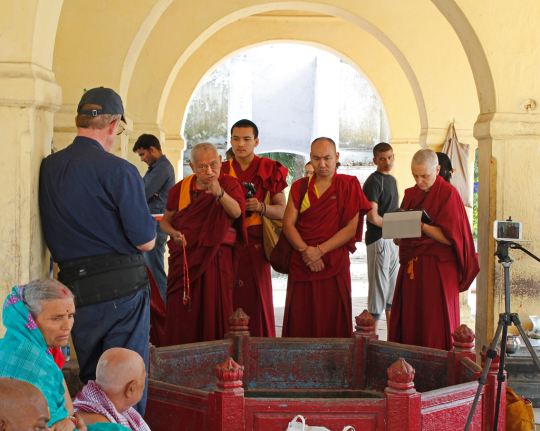
Lama Zopa Rinpoche teaching at Sujata, where Buddha practiced austerities for six years, India, March 2015. Photo by Ven. Lobsang Sherab.
“Many former pandits and yogis from India, Nepal and Tibet, so many, achieved full enlightenment within some years by practicing and integrating their life with this practice, the Guru Puja (Lama Chöpa),” Lama Zopa Rinpoche said during the 25th Kopan course in 1992. “In this teaching it is mentioned, ‘Please grant me blessings to be able to hold the banner of liberation by avoiding the thought, the mind seeing samsara, which is like unbearable prison, as a beautiful, joyful, pleasant, happy park by keeping the treasure, the three higher trainings and the the arya beings’ wealth.’
“First, if it is described a little, just briefly, avoid the mind seeing samsara, which is like unbearable prison, as a pleasure park. The city is not samsara, the mountains are not samsara, the farm, fields are not samsara, cars are not samsara. So, what is samsara? Samsara is this consciousness, this mind which experiences so much suffering – this is samsara. This body which experiences so many problems – this is samsara. Now, the association of this body and mind, this which is the container of all the problems, which feels hunger, thirst, hot and cold, which experiences all these problems – this is what is called samsara, which in English means ‘circling.'”
Excerpted from the transcripts of the 25th Kopan course (http://bit.ly/25th-kopan-course) made available by the Lama Yeshe Wisdom Archive. Lightly edited by Mandala for inclusion on FPMT.org.
Learn more about Lama Zopa Rinpoche, spiritual director of the Foundation for the Preservation of Mahayana Tradition (FPMT), and Rinpoche’s vision for a better world. Sign up to receive news and updates.
26
Let Go of the Fire
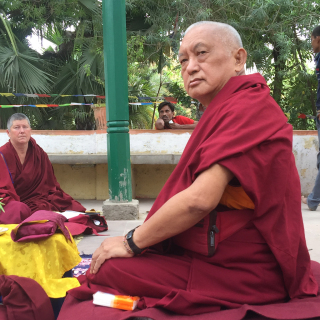
Lama Zopa Rinpoche teaching at Sujata, India, March 2015. Photo by Ven. Roger Kunsang.
During March 2015, Lama Zopa Rinpoche taught at Sujata, India, the site where Buddha practiced austerities for six years before later attaining enlightenment at the site of the Mahabodhi Temple in Bodhgaya. Ven. Roger Kunsang shared some brief quotes from the teaching:
“First, you don’t harm others, that’s the basis. Then as much as you can, benefit others.
“As long as you hold onto the fire, the pain will not stop. So as long as you hold on to the ’I,’ the suffering will not stop.”
Lama Zopa Rinpoche is the spiritual director of the Foundation for the Preservation of Mahayana Tradition (FPMT), a Tibetan Buddhist organization dedicated to the transmission of the Mahayana Buddhist tradition and values worldwide through teaching, meditation and community service.
- Tagged: lama zopa rinpoche, sujata
- 0
25
We Should Use Education to Benefit Others, Not Destroy Them
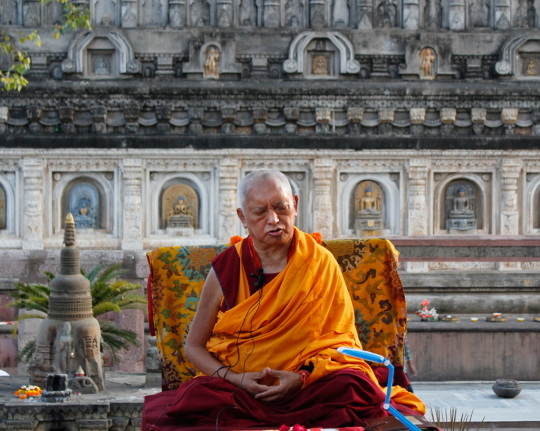
Lama Zopa Rinpoche giving the oral transmission of the Vajra Cutter Sutra at the Mahabodhi Temple, Bodhgaya, India, March 2015. Photo by Ven. Losang Sherab.
Lama Zopa Rinpoche has been at Root Institute in Bodhgaya, India since February 2, taking every opportunity to engage in round the clock meritorious activities and offer blessings to many people and animals. Rinpoche has also been visiting the students of Root’s Maitreya School, a free school benefiting local impoverished children, and recently commented:
“Some people have a very good education. They attend kindergarden, primary and secondary school, whilst some even attend university and get the highest qualifications, but they use it for negative things like masterminding war. We should use education to work on our inner minds as well as our academic knowledge to benefit others, not destroy them.”
Learn more about Lama Zopa Rinpoche, spiritual director of the Foundation for the Preservation of Mahayana Tradition (FPMT), and Rinpoche’s vision for a better world. Sign up to receive news and updates.
- Tagged: bodhgaya, education, lama zopa rinpoche, root institute
- 0
19
The Yoga of Going to Sleep
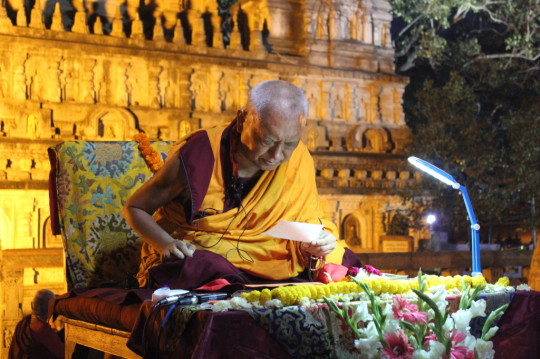
Lama Zopa Rinpoche giving the oral transmission of the Vajra Cutter Sutra at the Mahabodhi Stupa, Bodhgaya, India, March 2015. Photo by Ven. Lobsang Sherab.
“When you go to bed, when you go to sleep … this is what you are about to do when you get back to your room. Or maybe here! Maybe, if I continue a little bit, then maybe here!” Lama Zopa Rinpoche joked during the 41st Kopan course in December 2008.
“It is mentioned by Lama Tsongkhapa that when you go to bed, first wash your feet. I think washing the feet helps the mind to be fresh, to be not heavy, not sleepy, where you can’t wake up. The mind is clearer.
“Then, you go to bed in the position when the Buddha was passing away, on the right side in the position of a lion laying down, not sleeping flat on the bed. Your two legs are stretched out, the left leg put on the right, laying down in the position of a snow lion. It is said that with this method you wake up easily, so as to not waste your life, to not have a very drowsy, very heavy sleep. It is very easy to wake up to do practice.
“When you go to bed, think of light. Generate virtuous thoughts until you fall asleep. Generate virtuous thoughts in meditation.
“Also, when you’re about to fall sleep, you have to have the intention, the motivation, not to be overwhelmed by sleep, and without the delay of getting up. That is mentioned in the teachings. It is also mentioned in the teachings that there are three parts of the night: the upper part of the night, the middle part of the night and the lower part of the night. So, for those upper and lower parts of the night, practice Dharma, virtue, don’t sleep. In the middle part of the night, sleep. That also helps with your health. In the early part of the night, practice Dharma, and also in the lower part of the night, in the early morning, get up and do practice. In the middle part, sleep. That way, you don’t waste your life.
“For example (I’m not making this definite, I’m just using an example) let’s say you want to get up at four o’clock to begin your practice, to not be overwhelmed by sleep. To be able to get up at that time in the early morning to begin the practice, you have to have that kind of motivation, to wake up at that time, to have that kind of energy, of inspiration.
“That’s what mentioned in the lam-rim teachings. It’s said that you should be like a deer living in the forest. It doesn’t have a house and there are many enemies, so when it sleeps, it is a very light sleep, it keeps its ears up. It is a very light sleep because it has to be careful. It’s explained in the teachings like that. It means to not waste your life but instead to get up early in the morning to be able to begin your practice.
“Because you went to bed remembering the Buddha’s position, even when you go to bed, you don’t forget the Buddha. That helps. When you do that every night, that helps when you die. One day when you are in the situation where you suddenly die, or even if you are gradually dying, because you have done this all the time, it is easy to remember the Buddha at that time, and you don’t get reborn in lower realms. You’re totally safe if you remember the Buddha at that time. The mind is always in virtue, it is never separated from virtue, from Dharma, so it helps with that. …”
Lama Zopa Rinpoche gives more advice on sleep yoga (see Lecture 9) in the transcripts of the 41st Kopan course (http://bit.ly/41st-kopan-course), lightly edited by Gordon McDougall and made available by the Lama Yeshe Wisdom Archive. This excerpt was further edited by Mandala for inclusion on FPMT.org.
Learn more about Lama Zopa Rinpoche, spiritual director of the Foundation for the Preservation of Mahayana Tradition (FPMT), and Rinpoche’s vision for a better world. Sign up to receive news and updates.
- Tagged: advice, kopan course, lama yeshe wisdom archive, lama zopa rinpoche, sleep
- 0
18
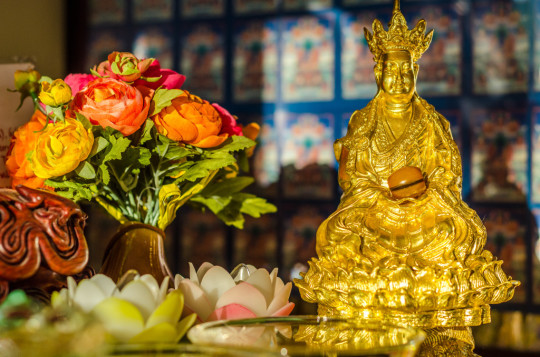
Ksitigarbha, Kachoe Dechen Ling, Aptos, California, US, November 2014. Photo by Chris Majors.
A student of Lama Zopa Rinpoche wrote: “The reason I’m writing is that I feel that I do not progress, I feel blocked, seemingly blocked by myself. I have clear moments where I have the motivation and plans for practicing, but always I seem to step back. Never progressing.”
My dear student,
What you explained in your letter is the same as myself – I plan to practice, but then it doesn’t happen.
All the problem is because of not having meditated well on impermanence and death. You should read Heart Spoon by Pabongka Rinpoche and other things on impermanence and death.
Think: “Today children died in their mother’s womb, even after the consciousness took place on the fertilized egg; other children died just after being born. Many young, middle-aged and old people also died. Not only those with cancer died. Many people are dying every day from car accidents, from heart attacks. People suddenly die in so many ways. Therefore, I could be dead at any time. Any year, any month, any week, even today, I could die. After death there are only two ways: rebirth in the lower realms or in the higher realms. There’s no third option.”
Like a waterfall or like waves on the ocean, negative karmas come one after another. It is difficult to practice pure Dharma, to create pure virtue. Many times things are done thinking they’re virtue, but they don’t become Dharma, even some [outwardly looking] Dharma practice.
Also, we don’t practice compassion; we don’t practice patience. Anger and heresy arise and destroy merit depending on who you get angry with. If a non-bodhisattva gets angry with a bodhisattva, they destroy 1,000 eons of merits from making offerings to Buddha and so forth for each second they get angry. If you get angry with a buddha – wow, wow, wow! It must be hundreds of thousands or millions of eons of merit that get destroyed. And then there is the guru, the most powerful object, more powerful than numberless buddhas. Giving rise to heresy or anger with the guru for even one second destroys so many eons of merit in that one second. Even Buddhists don’t pay attention to these practices of patience and compassion.
The other thing is that even if some Dharma practice that collects merit is done, if it’s not dedicated to enlightenment for sentient beings, it can be completely destroyed by anger, heresy, ill will and so forth. Even merit dedicated to achieve enlightenment for sentient beings, if it’s not sealed with emptiness, the merits become weaker. It needs to be sealed with emptiness. For example, if there is a huge rocky mountain, even if trucks take away many loads of dirt, the rest of the mountain is there.
Seal with emptiness by reciting the following dedication: “Due to all the past, present and future merits collected by me and those collected by numberless sentient beings and numberless buddhas, which do not exist from their own side at all but are totally empty, may the I, which does not exist from its own side but is totally empty, achieve the state of omniscient mind, which does not exist from its own side but is totally empty, and lead all the sentient beings, who do not exist from their own side but are totally empty from their own side, to that state of omniscient mind, which does not exist from it’s own side but is totally empty, by myself alone, who does not exist at all from its own side but is totally empty.”
With much love and prayer,
Lama Zopa Rinpoche
Scribed by Ven. Ailsa Cameron, Kopan Monastery, Nepal, December 2013. Lightly edited by Mandala for inclusion on FPMT.org.
Lama Zopa Rinpoche is the spiritual director of the Foundation for the Preservation of Mahayana Tradition (FPMT), a Tibetan Buddhist organization dedicated to the transmission of the Mahayana Buddhist tradition and values worldwide through teaching, meditation and community service.
- Tagged: advice from lama zopa rinpoche, practice
- 0
17
The Dancers of the Three Principal Aspects [Video]
In this short video made public by Lama Yeshe Wisdom Archive, Lama Zopa Rinpoche gives a swift summary of the three principal aspects of the path: renunciation, bodhichitta and the right view on emptiness.
Watch “Rinpoche’s Dharma Gems: The Dancers of the Three Principal Aspects” on YouTube.
For more teachings from Lama Zopa Rinpoche on the three principal aspects of the path visit: http://bit.ly/LZR-The-Importance-of-the-Three-Principal-Aspects-of-the-Path
Learn more about Lama Zopa Rinpoche, spiritual director of the Foundation for the Preservation of Mahayana Tradition (FPMT), and Rinpoche’s vision for a better world. Sign up to receive news and updates.
16
The Very Deep Kindness of the Enemy
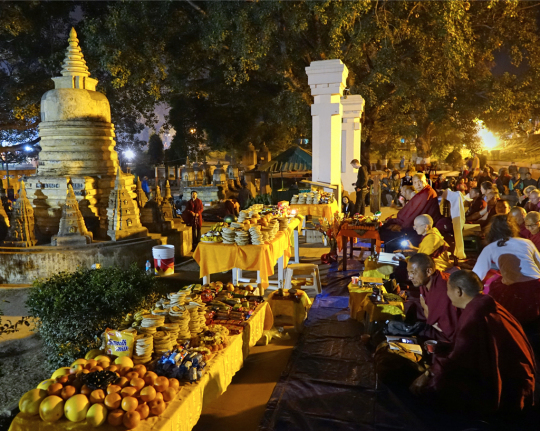
Lama Zopa Rinpoche at the Mahabodhi Stupa offering 1,000 tsogs, Bodhgaya, India, February 14, 2015. Photo by Ven. Roger Kunsang.
“One time at Dharamsala, the main teacher in the monastery called the Dialectics School walked past me as I was coming down to the palace with ‘the nose up’ as you say, looking down,” Lama Zopa Rinpoche told the attendees of the 33rd Kopan course in 2000.
“I think I bowed down or something like that and the teacher didn’t. Because I didn’t apply meditation immediately, didn’t practice mindfulness, it upset me. When I went up to Tushita Retreat Centre and sat down in my room, I thought about that teacher. As I sat down on my bed, the thought came, as soon as I sat down, I was thinking very strongly of him. The thought came in my mind that I’m only a friend of my ego, I’m only developing my ego. But this person is helping me to destroy my ego. He’s helping me to destroy my ego. I have always been a friend of my ego. Everything I do has been to develop my ego, to make it bigger. But, here, he’s helping me to destroy my ego. So how kind he is. How kind!
“This is so precious because, if you don’t have an ego, then you have bodhichitta. If you don’t have the self-cherishing thought, then you have bodhichitta. And with bodhichitta you can become enlightened. It also makes it possible to collect so much merit that you can realize emptiness and you can cease the gross and subtle defilements and achieve full enlightenment to be able to liberate numberless other sentient beings. Those who are obscured and suffering, you’re able to bring to full enlightenment. This person is making it possible to happen to you.
“My enemy the ego, my real enemy, who’s abiding in my heart – he’s helping me destroy it. This person is unbelievably precious, so kind. That is not just the kindness of somebody giving you a few hundred dollars or some food; the mother’s kindness; the parent’s kindness. That kind of kindness is something very deep: somebody who helps you to destroy your ego, the main obstacle to achieve enlightenment. It’s an unbelievable kindness; it’s so precious. That kindness is something very deep; it’s a kindness that you feel from bottom of your heart.
“Now you see a person who does that as unbelievably kind, so precious in your life. You see that person as so precious in your life. By putting a positive label on what the person did, it not only stopped the upsetness, I felt appreciation for the kindness of that person. The thought even came to repay the kindness, to thank him. The thought even came to give him a present to thank him. I thought about a present to thank him but unfortunately the present didn’t happen. Unfortunately, I physically didn’t actually manage to offer a present.”
Excerpted from the transcripts of the 33rd Kopan course (http://bit.ly/1BMgHms), lightly edited by Gordon McDougall and made available by the Lama Yeshe Wisdom Archive. Further lightly edited by Mandala for inclusion on FPMT.org.
Learn more about Lama Zopa Rinpoche, spiritual director of the Foundation for the Preservation of Mahayana Tradition (FPMT), and Rinpoche’s vision for a better world. Sign up to receive news and updates.
- Tagged: lama yeshe wisdom archive, lama zopa rinpoche
- 0
13
As a Mother Sees Her Most Beloved Child
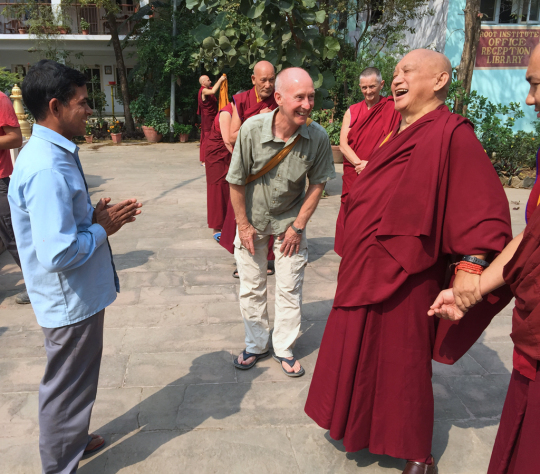
Lama Zopa Rinpoche being introduced by Frank Brock, former director of Root Institute, to the longest serving worker at Root Institute, who has been there since he was a boy, Bodhgaya, India, February 2015. Photo by Ven. Roger Kunsang.
“As a mother sees her most beloved child, if our mind has loving kindness, compassion and bodhichitta towards all other beings, then we see all beings – those who help us and even those who harm, whatever they do – we see them all as beautiful, just as a mother sees her most beloved child,” Lama Zopa Rinpoche explained at the 20th Kopan Course in December 1987. “But if our mind is empty of loving kindness, compassion, bodhichitta and the good heart, then no matter how much wealth, education or reputation we have – no matter how many things we have, there are continual problems and there is no peace in our life.
“Therefore, even if we don’t have even one dollar, even if we are homeless and beg for each meal, if our heart is filled with compassion and loving kindness towards others, there is incredible joyfulness, and unbelievable happiness and peace of mind. Even if we have no reputation, wealth or education, we see everyone as a friend – we feel it in our heart. There is no thought to give harm, only benefit, so our life is full of joy and every hour of our life becomes highly meaningful and beneficial.
“If we think carefully and examine this well, we understand that transforming our own mind into the good heart, the loving, compassionate thought of bodhichitta, is the source of all happiness. When we understand the temporary and ultimate benefits of bodhichitta, loving kindness, compassion and bodhichitta, and we practice this, we will receive these benefits. We will understand the teachings of the Buddha, whose emphasis is to avoid harming all sentient beings and to have compassion towards all sentient beings, and on top of that, we will benefit all sentient beings.
We see the teachings of the Buddha as so precious, and by understanding and practicing the teachings, we receive benefit and we feel close to Buddha. We feel that we are protected and guided by Shakyamuni Buddha, out of his kindness and compassion, and when we practice, we have the experience of how unbelievably kind Shakyamuni Buddha is.”
Taken from the the third lecture – “The Good Heart” – from the 20th Kopan Course on the Lama Yeshe Wisdom Archive.
Learn more about Lama Zopa Rinpoche, spiritual director of the Foundation for the Preservation of Mahayana Tradition (FPMT), and Rinpoche’s vision for a better world. Sign up to receive news and updates.
- Tagged: advice, lama yeshe wisdom archive, lama zopa rinpoche
- 0
12
It’s Not Sufficient to Have a Small Good Heart
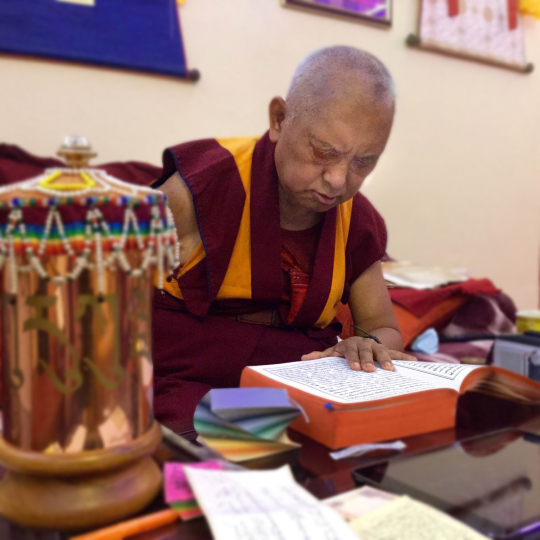
Lama Zopa Rinpoche reciting the Sutra of Golden Light for long-time student Anila Ann McNeil, who passed away February 22, 2015, Bodhgaya, India. Photo by Ven. Sarah Thresher.
“It’s best in our day-to-day life to practice some positive attitude, having some renunciation, having some satisfaction, controlling the dissatisfied mind, attachment,” Lama Zopa Rinpoche said in Lama Yeshe Wisdom Archive’s newest ebook, Creating the Causes of Happiness. “We need to cut off the dissatisfied mind, attachment and so forth, the disturbing thoughts. It does depend on these things. It does depend on these things, but subduing the mind is not enough. Just having a little bit of a good heart in everyday life toward others, that’s not sufficient. That’s not enough. Having some generosity, that’s not enough. To subdue the mind we have to pacify completely, we have to subdue completely all the disturbing thoughts that interfere, that make us suffer in samsara endlessly. We have to pacify them completely.
“We have to completely subdue the mind because we don’t like problems. Since our aim is to not have problems at all, to never experience problems at all, to never die, since our wish is to never experience death, this is what we need to do. This is what Andrew said yesterday, ‘I never want to die.’ He kindly expressed his wishes, that he never wants to die. This is the wish in our heart, that we never want to die, that we never want to experience death, that we never want to experience any problems again. It’s our own disturbing mind that interferes with us achieving the everlasting ultimate liberation, and then full enlightenment. Since this is the wish, then we should – we have to – completely subdue our mind in order to completely cease all these obstacles that are within, that are on our own mental continuum.
“The point I’m making is this. To subdue the mind, of course, it’s good in day-to-day life to do even a small act of generosity, to have even a small good heart, but that’s not sufficient. When some animal has a problem, we can help that animal. When a cat or dog is sick, we can put it in hospital; when a person is sick, we can give some medicine. Those actions are very good, but we can’t be satisfied with just some generosity, some sympathy. Subduing the mind in that way is not enough. Completely subduing the mind, achieving enlightenment is dependent on these day-to-day things, even a small act of generosity, even some small compassion, it depends on these things, but just this is not enough at all for us to achieve peerless happiness, the cessation of all the mistakes, completing all the realizations, and especially for the sake of numberless sentient beings equaling the infinite space. Especially for the sake of them, it’s not enough. We have to complete developing the mind on the whole path.”
Creating the Causes of Happiness (http://bit.ly/creating-the-causes-of-happiness) is available from Lama Yeshe Wisdom Archive through a variety of ebook distributors. This ebook is the second volume in Lama Yeshe Wisdom Archive’s four-part ebook series taken from the lightly edited transcripts of the 24th Kopan lam-rim course in 1991.
Learn more about Lama Zopa Rinpoche, spiritual director of the Foundation for the Preservation of Mahayana Tradition (FPMT), and Rinpoche’s vision for a better world. Sign up to receive news and updates.
11
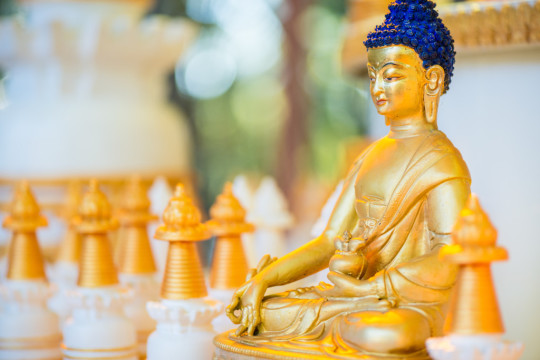
Medicine Buddha, Kachoe Dechen Ling, Aptos, California, US, July 2014. Photo by Chris Majors.
A student wrote Lama Zopa Rinpoche and asked for advice about blessing food as the student’s family owns a factory that makes food that is later sold in shops.
My most dear, most kind, most precious wish-fulfilling student,
Regarding your question about blessing the food, you recite OM AH HUM and visualize all the buddhas and bodhisattvas blessing the food with the qualities of holy body, speech and mind. This absorbs into the food where the food is. It is all absorbed into the food.
Then recite OM AH HUM.
Visualize that then every grain and part of the food is a blue HUM and into that numberless buddhas’ and bodhisattvas’ holy body, speech and mind all absorb into that. Then do that quite a number of malas of the mantra (OM AH HUM); the more you do, the better. The HUMs become the grains or food particles.
Then make a prayer to the merit field, Medicine Buddha, Tara and Chenrezig (but particularly Medicine Buddha) and pray that all the buddhas and bodhisattvas bless the food and that there never comes from it any side effects; it immediately purifies, the minute the food goes inside the mouth, it immediately purifies all the negative karmas collected from beginningless rebirths, not only that envy, but all diseases and spirit harms are purified. Also, pray that all realizations from guru devotion up to enlightenment are actualized, all the realizations are generated, especially bodhichitta, and it brings to all sentient beings perfect peace and happiness in this world. Then all the wishes of happiness and all successes – according to holy Dharma – are immediately received. All the wishes up to enlightenment are actualized.
That is what you should pray. You and everyone can do that meditation.
You can do the meditation and practice in the factory. You can also do it from home as long as all the food is piled up in one place and you know exactly where it is.
Please continue to make your life most meaningful with the thought of bodhichitta night and day and in every action that you do.
With much love and prayers,
Lama Zopa
Scribed by Ven. Holly Ansett, Kachoe Dechen Ling, Aptos, California, United States, October 2013. Lightly edited by Mandala for inclusion on FPMT.org.
Lama Zopa Rinpoche is the spiritual director of the Foundation for the Preservation of Mahayana Tradition (FPMT), a Tibetan Buddhist organization dedicated to the transmission of the Mahayana Buddhist tradition and values worldwide through teaching, meditation and community service.
- Tagged: advice from lama zopa rinpoche, food, practice
- 0
10
The Most Powerful Practice for Patience Is Emptiness
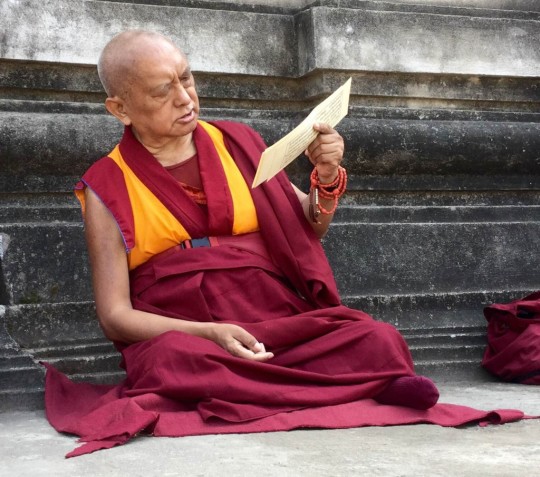
Lama Zopa Rinpoche reading Lama Tsongkhapa’s “Lekshe Nyingpo,” Bodhgaya, India, March 2015. Photo by Ven. Sarah Thresher.
While Lama Zopa Rinpoche was staying at Root Institute in Bodhgaya, India, he engaged in round the clock meritorious activities and offered blessings to many people and animals during the first 15 days of Tibetan New Year. Ven. Sarah Thresher recently shared news of some of Rinpoche’s beneficial activities:
This morning we completed the Tara initiation that began three days ago. Our days have been so busy. Rinpoche would come in the middle of the night to do preparation for the initiation and we would begin around 3 or 4 a.m., taking it until breakfast. These are the last few days of the Losar merit increasing days and Rinpoche has inspired us to practice continually day and night. Even working in shifts, it is impossible to keep up with the endless and effortless flow of virtue and we have all been operating on very few hours of sleep!
The past few days Rinpoche has been going to the Mahabodhi Stupa to practice during and take advantage of the merit increasing days. Rinpoche especially wanted to complete the reading of Lama Tsongkhapa’s Lekshe Nyingpo, a profound text clarifying all the subtle points of the view of emptiness according to the four schools of Buddhist philosophical tenets, which he started to read last year. When he arrived in Bodhgaya, Rinpoche would go in the evenings to make offerings and circumambulate the stupa while reciting the text, but since there were still many pages left, the past two days Rinpoche has been sitting in the shade at the small stupa, where Buddha gazed unblinkingly at the Bodhi tree during the third week after enlightenment, focusing on the recitation. When he finishes, Rinpoche sits in meditation on emptiness for a while. Around us the sound of chanting and pujas from all different traditions of Buddhism harmonize as Rinpoche sits in a state of deep absorption.
Since Rinpoche arrived at Root, we have been fortunate to receive so many teachings and pieces of advice on emptiness. In fact, a series of teachings on patience focused mainly on emptiness. “The most powerful practice for patience is emptiness,” Rinpoche explained.
On Day of Miracles, March 5, Rinpoche spent four hours reciting and meditating on Lekshe Nyingpo in the morning and then returned in the evening to lead 2,000 tsog offerings. We sat under the Bodhi tree for the tsog offering and in front of us was Sogyal Rinpoche leading prayers with a group of students from Rigpa. At the end of the prayers, Sogyal Rinpoche came up to greet Rinpoche, offering a khata and remarking how beautifully Rinpoche had been chanting Calling the Guru from Afar. He asked Rinpoche to live long because Rinpoche does so many activities to benefit others.
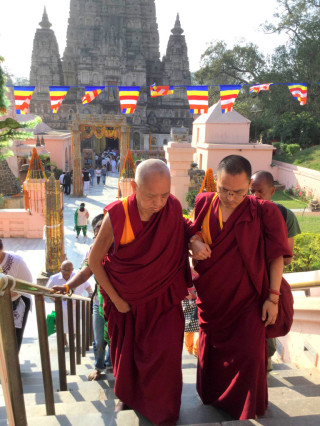
Lama Zopa Rinpoche leaving the Mahabodhi Stupa complex, Bodhgaya, India, March 2015. Photo by Ven. Sarah Thresher.
The day before Day of Miracles, we offered a simple long life offering to Rinpoche. Since there have been so many pujas over the recent days, we checked with Rinpoche which puja would be best and Rinpoche said he would like to do the long Sixteen Arhats puja, which is very powerful for preserving the Dharma as well as for the gurus’ long lives. We were fortunate that Keutsang Rinpoche happily accepted to come and present the offerings to Rinpoche. At the beginning of the puja, Rinpoche dedicated the puja to His Holiness the Dalai Lama, all his gurus, all the FPMT center directors and staff, all the students and all sentient beings who are creating virtue. Rinpoche quoted President Obama’s recent description of His Holiness as “a powerful example of what it means to practice compassion” and emphasized how important it is that world leaders are able to meet and be inspired by His Holiness. The puja was quite simple but Rinpoche expressed at the end that he enjoyed it and joked that he and Keutsang Rinpoche could now go on holiday to Goa or Tahiti with all the money offerings we had made! But then Rinpoche promptly donated back all the money to Root Institute’s projects and to help build a new Maitreya statue at the institute.
Rinpoche was supposed to leave immediately after March 5, but is now delaying a few more days.
Lama Zopa Rinpoche is the spiritual director of the Foundation for the Preservation of Mahayana Tradition (FPMT), a Tibetan Buddhist organization dedicated to the transmission of the Mahayana Buddhist tradition and values worldwide through teaching, meditation and community service.
- Tagged: bodhgaya, emptiness, lama zopa rinpoche, patience, ven. sarah thresher
- 0
9
The Deceiving Mind
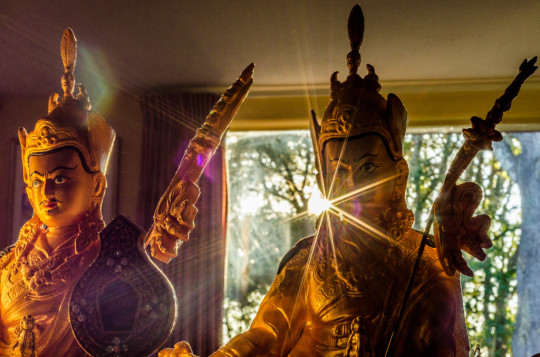
Statues of Padmasambhava, Kachoe Dechen Ling, Aptos, California, US, November 2104. Photo by Chris Majors.
Lama Zopa Rinpoche arrived at Root Institute in Bodhgaya, India, on February 2, where he engaged in round the clock meritorious activities and offered blessings to many people and animals. On March 2, Ven. Roger Kunsang shared this on his Twitter page:
Lama Zopa Rinpoche, teaching very energetically: our own mind is always deceiving us all the time, hiding the reality of how things exist.
Ven. Roger Kunsang, Lama Zopa Rinpoche’s assistant and CEO of FPMT Inc., shares Lama Zopa Rinpoche’s recent pith sayings on Ven. Roger’s Twitter page. (You can also read them on Ven. Roger’s Facebook page.)
More information, photos and updates about FPMT spiritual director Lama Zopa Rinpoche can be found on Rinpoche’s homepage. If you’d like to receive news of Lama Zopa Rinpoche via email, sign up to Lama Zopa Rinpoche News.
- Tagged: lama zopa rinpoche, twitter
- 0
- Home
- News/Media
- Study & Practice
- About FPMT Education Services
- Latest News
- Programs
- New to Buddhism?
- Buddhist Mind Science: Activating Your Potential
- Heart Advice for Death and Dying
- Discovering Buddhism
- Living in the Path
- Exploring Buddhism
- FPMT Basic Program
- FPMT Masters Program
- FPMT In-Depth Meditation Training
- Maitripa College
- Lotsawa Rinchen Zangpo Translator Program
- Universal Education for Compassion & Wisdom
- Online Learning Center
- Prayers & Practice Materials
- Overview of Prayers & Practices
- Full Catalogue of Prayers & Practice Materials
- Explore Popular Topics
- Benefiting Animals
- Chenrezig Resources
- Death & Dying Resources
- Lama Chopa (Guru Puja)
- Lama Zopa Rinpoche: Compendium of Precious Instructions
- Lama Zopa Rinpoche: Life Practice Advice
- Lama Zopa Rinpoche Practice Series
- Lamrim Resources
- Mantras
- Prayer Book Updates
- Purification Practices
- Sutras
- Thought Transformation (Lojong)
- Audio Materials
- Dharma Dates – Tibetan Calendar
- Translation Services
- Publishing Services
- Teachings and Advice
- Find Teachings and Advice
- Lama Zopa Rinpoche Advice Page
- Lama Zopa Rinpoche: Compendium of Precious Instructions
- Lama Zopa Rinpoche Video Teachings
- ༧སྐྱབས་རྗེ་བཟོད་པ་རིན་པོ་ཆེ་མཆོག་ནས་སྩལ་བའི་བཀའ་སློབ་བརྙན་འཕྲིན།
- Podcasts
- Lama Yeshe Wisdom Archive
- Buddhism FAQ
- Dharma for Young People
- Resources on Holy Objects
- Ways to Offer Support
- Centers
- Affiliates Area
- Teachers
- Projects
- Charitable Projects
- Make a Donation
- Applying for Grants
- News about Projects
- Other Projects within FPMT
- Support International Office
- Projects Photo Galleries
- Give Where Most Needed
- FPMT
- Shop
Translate*
*powered by Google TranslateTranslation of pages on fpmt.org is performed by Google Translate, a third party service which FPMT has no control over. The service provides automated computer translations that are only an approximation of the websites' original content. The translations should not be considered exact and only used as a rough guide.Real happiness in life starts when you begin to cherish others.







